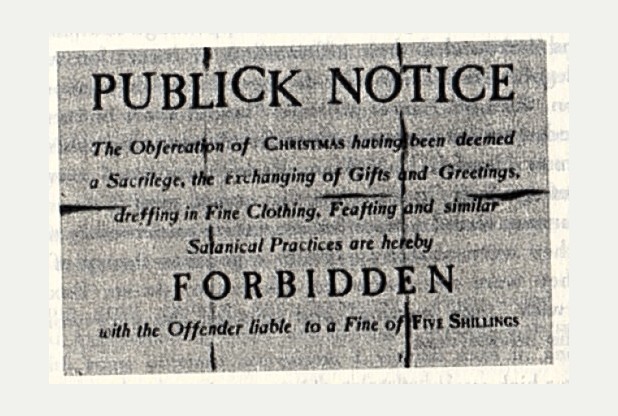Complaints about the commercial-age corruption of Christmas miss one critical fact: as a mass public celebration, the holiday is a rather recent invention. Whether we credit Charles Dickens, Bing Crosby, or Frank Capra—men not opposed to marketing—we must reckon with Christmas as a product of modernity. That includes the sacred ideas about family, piety, and gratitude we attach to the season.
The Puritans of the Massachusetts Bay Colony “despised Christmas,” notes Boing Boing. They associated it with debauchery: heavy drinking, gluttony, riots, “rowdiness and sinful behavior.” Not only that, but they “saw it as a false holiday with stronger ties to paganism than Christianity,” writes Rebecca Beatrice Brooks at the History of Massachusetts blog, and “they were correct, according to the book The Battle for Christmas.”
The History Dose video above informs us that in 1659, “the General Court of Massachusetts made it illegal to celebrate Christmas.” Feasting, or even taking off work on December 25th would result in a fine of five shillings. It seems extreme, but the holiday had a carnivalesque reputation at the time. Not only were revelers, at the end of a long year’s work, eager to enjoy the spoils of their labor, but their caroling might even turn into a kind of violent trick-or-treating.
“On some occasions the carolers would become rowdy and invade wealthy homes demanding food and drink,” Brooks writes. They “would vandalize the home if the owner refused.” The Puritans’ authoritarian streak, and respect for the sanctity of private property, made canceling Christmas the only seemingly logical thing to do, with a ban lasting 22 years. In any case, explicit ban or no, spurning Christmas was common practice for two hundred years of New England’s colonial history.

In the end, for all its supposed intrusions into the snow globe of Christmas purism, “we can partially thank commercialization for sustaining the domestic brand of Christmas we have today”—the brand, that is, that ensures we can’t stop talking about, reading about, and hearing about Christmas, whatever our beliefs, in the several weeks leading up to December 25th.
If you would like to sign up for Open Culture’s free email newsletter, please find it here. It’s a great way to see our new posts, all bundled in one email, each day.
If you would like to support the mission of Open Culture, consider making a donation to our site. It’s hard to rely 100% on ads, and your contributions will help us continue providing the best free cultural and educational materials to learners everywhere. You can contribute through PayPal, Patreon, and Venmo (@openculture). Thanks!
Related Content:
Behold! The Very First Christmas Card (1843)
John Waters’ Hand-Made, Oddball Christmas Cards: 1964-Present
Watch Björk, Age 11, Read a Christmas Nativity Story on an Icelandic TV Special (1976)
Langston Hughes’ Homemade Christmas Cards From 1950
Josh Jones is a writer and musician based in Durham, NC. Follow him at @jdmagness.


Sure, Christmas is bloated and commercial but it certainly beats puritanical authoritarianism!